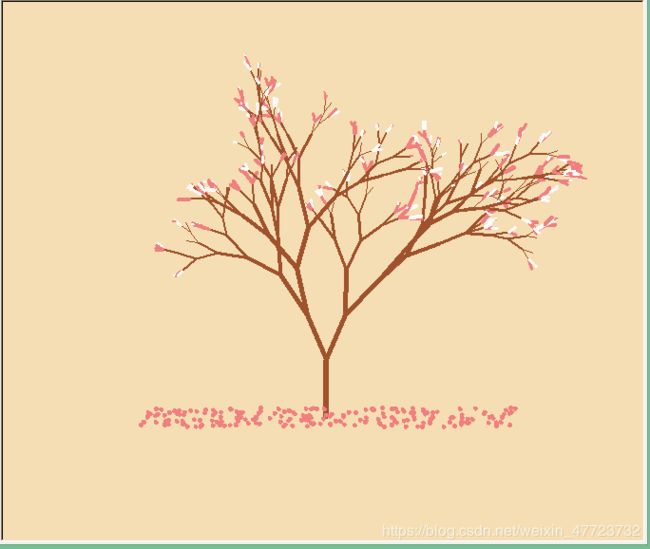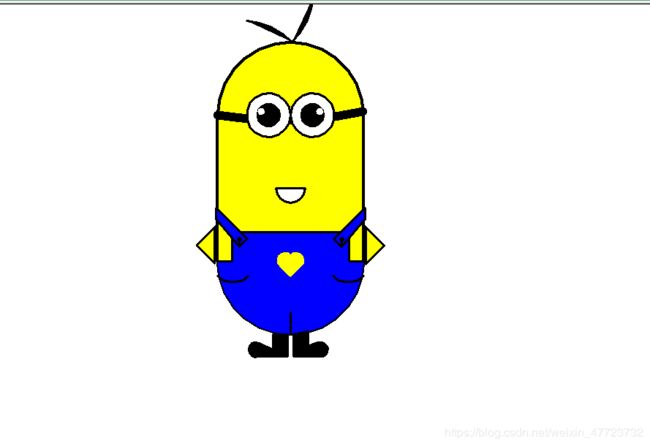初识python之画图神器篇
前言
前面我们写了一篇关于python实例的汇率转换的文章,有的小伙伴说它虽然可以解决我们生活中的实际问题,但是好像缺少点什么。
我仔细想了想,想起了一句话,“生活不止眼前的苟且,还有诗和远方!”,确实我们应该用python来解决和丰富我们的生活。那么这期文章我就为大家介绍关于python的艺术美——画图神器
在数学中有一种美,叫几何美,我们又称为艺术美,用具有规律的线条,迭代出美丽的图片,这就是许多艺术家在创作是的灵感渠道。下面我们就为大家准备了一个简单的五角星绘制。
****涉及第三库的导入,模块的导入,还有一些我想我现在也介绍不完,下面就让我们一起来领略美感吧!
import turtle
def draw_recursive_pentargram(size):
'''
迭代绘制五角星
'''
count = 1
while count <= 5:
turtle.backward(size)
turtle.right(144)
count += 1
# 五角星绘制完成,更新参数
size += 10
if size <= 100:
draw_recursive_pentargram(size)
def main():
'''
主函数
'''
turtle.speed(0)
# turtle.penup()
turtle.forward(40)
# turtle.pendown()
turtle.pensize(2)
turtle.pencolor("red")
turtle.bgcolor('black')
size = 50
draw_recursive_pentargram(size)
turtle.exitonclick()
if __name__ == "__main__":
main()
 是不是感觉挺神奇的,其实这个算法是最简单的。下面我就让大家来见识一下它的真正的本领,感性的魅力。
是不是感觉挺神奇的,其实这个算法是最简单的。下面我就让大家来见识一下它的真正的本领,感性的魅力。
这个代码我是去向大师借来的哟,不是小王自己写的,嘻嘻嘻。
# 小黄人绘制案例************************************************************************
import turtle
t = turtle.Turtle()
wn = turtle.Screen()
turtle.colormode(255)
t.hideturtle()
t.speed(10)
t.penup()
t.pensize(4)
t.goto(100,0)
t.pendown()
t.left(90)
t.color((0,0,0),(255,255,0))
#身体绘制上色
t.begin_fill()
t.forward(200)
t.circle(100,180)
t.forward(200)
t.circle(100,180)
t.end_fill()
#右眼睛绘制上色
t.pensize(12)
t.penup()
t.goto(-100,200)
t.pendown()
t.right(100)
t.circle(500,23)
t.pensize(3)
t.penup()
t.goto(0,200)
t.pendown()
t.seth(270)
t.color("black","white")
t.begin_fill()
t.circle(30)
t.end_fill()
t.penup()
t.goto(15,200)
t.pendown()
t.color("black","black")
t.begin_fill()
t.circle(15)
t.end_fill()
t.penup()
t.goto(35,205)
t.color("black","white")
t.begin_fill()
t.circle(5)
t.end_fill()
#左眼睛绘制上色
t.pensize(3)
t.penup()
t.goto(0,200)
t.pendown()
t.seth(90)
t.color("black","white")
t.begin_fill()
t.circle(30)
t.end_fill()
t.penup()
t.goto(-15,200)
t.pendown()
t.color("black","black")
t.begin_fill()
t.circle(15)
t.end_fill()
t.penup()
t.goto(-35,205)
t.color("black","white")
t.begin_fill()
t.circle(5)
t.end_fill()
#嘴绘制上色
t.penup()
t.goto(-20,100)
t.pendown()
t.seth(270)
t.color("black","white")
t.begin_fill()
t.circle(20,180)
t.left(90)
t.forward(40)
t.end_fill()
#裤子绘制上色
t.penup()
t.goto(-100,0)
t.pendown()
t.seth(0)
t.color("black","blue")
t.begin_fill()
t.forward(20)
t.left(90)
t.forward(40)
t.right(90)
t.forward(160)
t.right(90)
t.forward(40)
t.left(90)
t.forward(20)
t.seth(270)
t.penup()
t.goto(-100,0)
t.circle(100,180)
t.end_fill()
#左裤子腰带
t.penup()
t.goto(-70,20)
t.pendown()
t.color("black","blue")
t.begin_fill()
t.seth(45)
t.forward(15)
t.left(90)
t.forward(60)
t.seth(270)
t.forward(15)
t.left(40)
t.forward(50)
t.end_fill()
t.left(180)
t.goto(-70,30)
t.dot()
#右裤腰带
t.penup()
t.goto(70,20)
t.pendown()
t.color("black","blue")
t.begin_fill()
t.seth(135)
t.forward(15)
t.right(90)
t.forward(60)
t.seth(270)
t.forward(15)
t.right(40)
t.forward(50)
t.end_fill()
t.left(180)
t.goto(70,30)
t.dot()
#脚
t.penup()
t.goto(4,-100)
t.pendown()
t.seth(270)
t.color("black","black")
t.begin_fill()
t.forward(30)
t.left(90)
t.forward(40)
t.seth(20)
t.circle(10,180)
t.circle(400,2)
t.seth(90)
t.forward(20)
t.goto(4,-100)
t.end_fill()
t.penup()
t.goto(-4,-100)
t.pendown()
t.seth(270)
t.color("black","black")
t.begin_fill()
t.forward(30)
t.right(90)
t.forward(40)
t.seth(20)
t.circle(10,-225)
t.circle(400,-3)
t.seth(90)
t.forward(21)
t.goto(-4,-100)
t.end_fill()
#左手
t.penup()
t.goto(-100,50)
t.pendown()
t.seth(225)
t.color("black","yellow")
t.begin_fill()
t.forward(40)
t.left(90)
t.forward(35)
t.seth(90)
t.forward(50)
t.end_fill()
#右手
t.penup()
t.goto(100,50)
t.pendown()
t.seth(315)
t.color("black","yellow")
t.begin_fill()
t.forward(40)
t.right(90)
t.forward(36)
t.seth(90)
t.forward(50)
t.end_fill()
#
t.penup()
t.goto(0,-100)
t.pendown()
t.forward(30)
#
t.penup()
t.goto(0,-20)
t.pendown()
t.color("yellow")
t.begin_fill()
t.seth(45)
t.forward(20)
t.circle(10,180)
t.right(90)
t.circle(10,180)
t.forward(20)
t.end_fill()
#
t.penup()
t.color("black")
t.goto(-100,-20)
t.pendown()
t.circle(30,90)
t.penup()
t.goto(100,-20)
t.pendown()
t.circle(30,-90)
#头顶
t.penup()
t.goto(2,300)
t.pendown()
t.begin_fill()
t.seth(135)
t.circle(100,40)
t.end_fill()
t.penup()
t.goto(2,300)
t.pendown()
t.begin_fill()
t.seth(45)
t.circle(100,40)
t.end_fill()
turtle.exitonclick()
看似复杂而又繁琐的代码,它其实是由规律的,不信你可以自己看看它的写法。
樱花案例
import turtle as T
import random
import time
# 画樱花的躯干(60,t)
def Tree(branch, t):
time.sleep(0.0005)
if branch > 3:
if 8 <= branch <= 12:
if random.randint(0, 2) == 0:
t.color('snow') # 白
else:
t.color('lightcoral') # 淡珊瑚色
t.pensize(branch / 3)
elif branch < 8:
if random.randint(0, 1) == 0:
t.color('snow')
else:
t.color('lightcoral') # 淡珊瑚色
t.pensize(branch / 2)
else:
t.color('sienna') # 赭(zhě)色
t.pensize(branch / 10) # 6
t.forward(branch)
a = 1.5 * random.random()
t.right(20 * a)
b = 1.5 * random.random()
Tree(branch - 10 * b, t)
t.left(40 * a)
Tree(branch - 10 * b, t)
t.right(20 * a)
t.up()
t.backward(branch)
t.down()
# 掉落的花瓣
def Petal(m, t):
for i in range(m):
a = 200 - 400 * random.random()
b = 10 - 20 * random.random()
t.up()
t.forward(b)
t.left(90)
t.forward(a)
t.down()
t.color('lightcoral') # 淡珊瑚色
t.circle(1)
t.up()
t.backward(a)
t.right(90)
t.backward(b)
# 绘图区域
t = T.Turtle()
# 画布大小
w = T.Screen()
t.hideturtle() # 隐藏画笔
t.getscreen().tracer(5, 0)
w.screensize(bg='wheat') # wheat小麦
t.left(90)
t.up()
t.backward(150)
t.down()
t.color('sienna')
# 画樱花的躯干
Tree(60, t)
# 掉落的花瓣
Petal(200, t)
w.exitonclick()

喜欢的小伙伴可以去运行一下,再次声明一下,上面两个复杂算法,是其他的人写的。
好的,本期的文章就介绍到这里,喜欢的小伙伴就让更多的人知晓吧。
